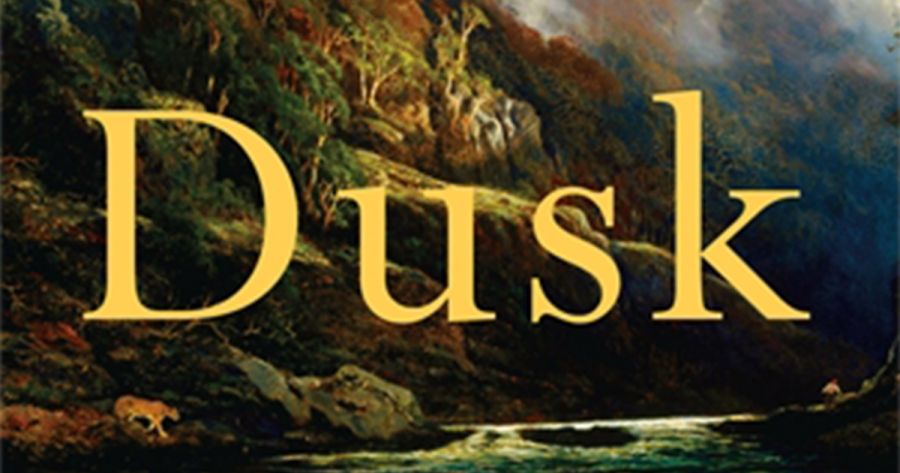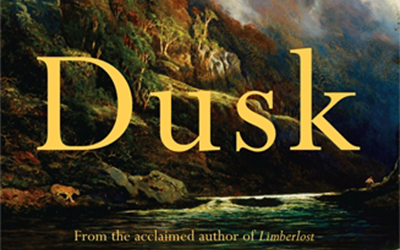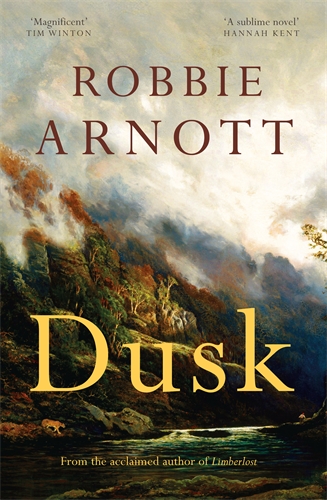
- Free Article: No
- Contents Category: Fiction
- Review Article: Yes
- Article Title: The untouched country
- Article Subtitle: Familiar territory from Robbie Arnott
- Online Only: No
- Custom Highlight Text:
Readers familiar with Robbie Arnott’s fiction will have some expectations about the kind of book the author is likely to conjure. Dusk sits comfortably inside the thematic and narrative territories he has previously explored, particularly in The Rain Heron (2020) and the wonderful Limberlost (2022). Dusk features Arnott’s typically vivid descriptive prose and his concern with the natural world and our place within it. Dusk generates pathos with delicate expertise and mixes genres while retaining a strong semblance of realism.
- Featured Image (400px * 250px):

- Alt Tag (Featured Image): Shannon Burns reviews ‘Dusk’ by Robbie Arnott
- Book 1 Title: Dusk
- Book 1 Biblio: Picador, $34.99 pb, 264 pp
- Book 1 Cover Small (400 x 600):

- Book 1 Cover (800 x 1200):

- Book 1 Readings Link: https://www.readings.com.au/product/9781761560941/dusk--robbie-arnott--2024--9781761560941#rac:jokjjzr6ly9m
Arnott conjures a duo who are, like the puma, subjects of speculation and rumour: ‘[I]t was not widely known where they were from. Little was known about them at all, except for the work they did, and even that was debated.’ Their different ways of reading landscape express their different temperaments: ‘Where her eyes had gone wide, roaming across the broader contours of the land, his tracked small, scanning its intimate features.’ The siblings are social outcasts whose parents were escaped convicts, transported by ship to an unnamed country after authorities caught them fishing in the wrong stream. For years, their parents ‘had done horrific things, unforgivable things … They were thieves. They were killers. They were what people said’, and their reluctant children were compelled to become their parents’ accomplices.
Decades later, the Renshaws are treated with suspicion and contempt wherever their name is known; they are burdened by the memory of their wrongdoings. This makes Iris yearn for an ‘untouched country where she could slide into the world’s seams without causing harm’. Floyd is particularly dependent on Iris, who helps relieve the pain of his permanently twisted back, the result of an injury suffered during one of Dusk’s pivotal incidents.
Iris is the novel’s central figure. She struggles with the ties that bind her to Floyd: the debt she owes him; her deep feeling for him and their shared history, balanced against the freedom she yearns for, one she can enjoy only in her brother’s absence. All of this is managed convincingly and compellingly. As with Limberlost, the attachment between the siblings is profound and has an emotional resonance that goes beyond other relationships. Arnott is a great writer of sibling love.
Still, I wonder if Arnott may have exhausted his primary material and is consequently repeating himself too closely. While it is skilfully done, Dusk reads like a companion or addendum to The Rain Heron, which itself recycled versions of a fable within its multi-part structure. Dusk retains the earlier novel’s emotional heft and narrative seductions, but forgoes the appealingly knotty character study embodied by Zoe Harker. Dusk’s protagonists are wholly sympathetic, and its villain is easy to despise.
Dusk blends the mythic with tropes from westerns (strangers travelling on horseback, trying to escape the past, lured by a bounty) and of horror (a predator on the loose, terrorising locals), with a dose of Beowulf, albeit subverted. While this makes for a pleasing fusion, some aspects of the plot and character development are worryingly familiar. As a consequence, what should be a surprising turn near the end is mere repetition.
In Limberlost, Ned West rescues a quoll that he had trapped and intended to kill, nursing it back to health and freedom; in The Rain Heron, Zoe Harker decides to return a fantastical creature she has mercilessly hunted and captured to its natural sanctuary, as a way of atoning for her misdeeds. These characters experience a change of heart that installs a greater purpose in their lives than mere self-preservation, upending the extractive, human- or self-centred relationship with the natural world in favour of something ‘more-than human’. Dusk treads similar ground, but in a slighter form.
Like Ned in Limberlost, Iris loses herself inside the territories she traverses; she is particularly responsive to the plains that adjoin the puma’s hunting grounds, experiencing ‘a freeing, lung-emptying openness’ where others perceived ‘harshness or bleakness’. Later, she feels a recognition and sense of belonging to place that has no rational basis but is no less compelling for that. She feels that ‘the country ... got inside her, had changed her’.
This, too, is familiar territory for Arnott’s characters and represents something like a moral and existential imperative: instead of merely reading their environment in an instrumental way, they are transformed by it, and that transformation helps them to find purpose and opportunities for atonement. For the Renshaw siblings, it provides ‘a chance to assist in an act that went beyond their own survival. A chance to fix a wrong in the world, and in the process somehow fix a wrong in themselves.’
The reader has no room to make this kind of evaluation about the protagonists’ motives or behaviour for themselves. The meaning of each act in Dusk is clearly signalled and managed as carefully as its plot. We follow the crumbs through the forest, all readily visible, all in close proximity to the next, leading us to a pleasing conclusion. There is real enjoyment in this kind of reading, which feels to me like sleepwalking, but its resonance is limited: as with a dream, the story dissolves soon after it ends, leaving behind only a faint impression. Dusk’s pleasures are immediate, and welcome, but short-lived.


Comments powered by CComment